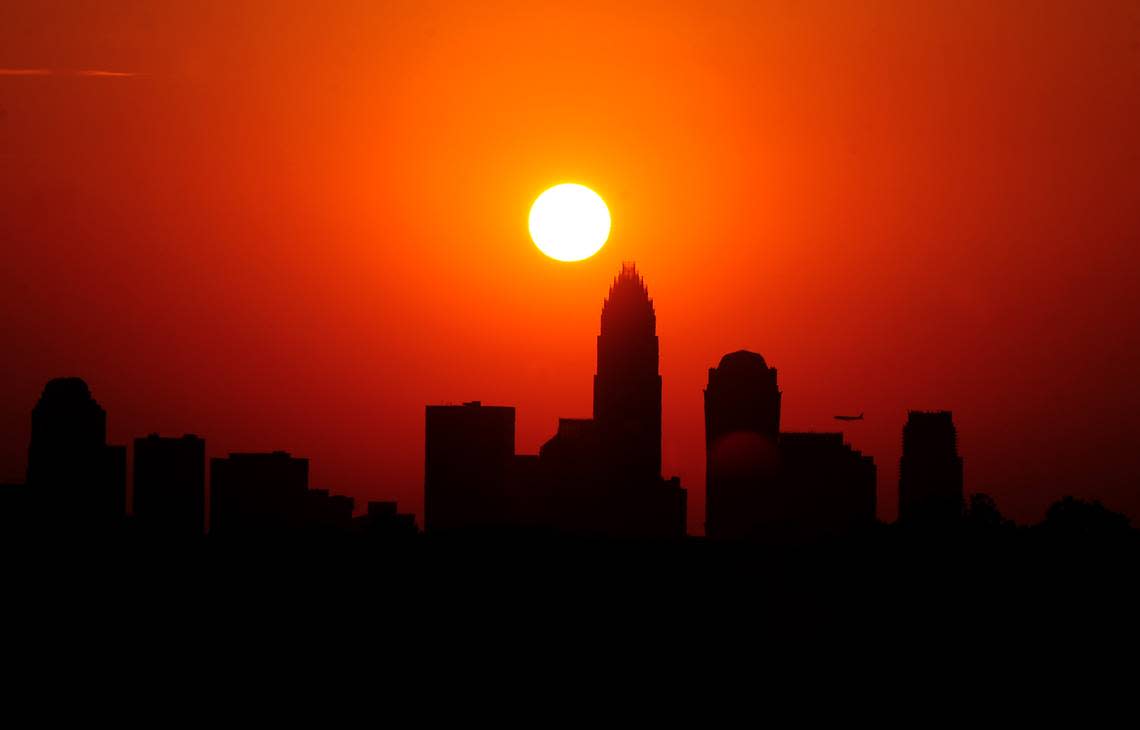A heat wave is hitting NC this week. “A different kind of heat” is coming next. | Opinion

Summer will arrive at the moment of solstice near dusk on Thursday, but it will mark more than the start of the year’s warmest season. Scientists think it’s likely to be the start of the hottest summer ever recorded because of climate change and an El Niño weather cycle.
Forecasters predict summer will get off to a blazing start, with temperatures expected to climb to near 100 degrees Saturday and remaining hot through the weekend. Much of the eastern United States is expected to swelter under a “heat dome” that’s currently baking parts of the Midwest.
To hear more about what to expect and what it all means, I spoke with state climatologist Kathie Dello, director of the North Carolina State Climate Office at N.C. State University. She didn’t open our conversation with an encouraging forecast. “Saturday is going to be terrible,” she said.
But what really matters, Dello said, isn’t one blistering day. North Carolinians are used to that. What matters is that there are going to be more of them and, more significantly, there is going to be less relief at night.
“We are shifting the needle to having conditions that are hotter than what we expected before. It may not be a record, but it’s relentless,” she said. “When you just continue to experience hotter weather than you’re used to, even if it’s not necessarily the hottest day on record, it can be tough.”
The heat will be especially hard on people who can’t afford air conditioning or live in urban heat islands, she said, but it’s also going to be hard on livestock and disrupts agriculture, especially certain fruit trees that need cool nights to flourish. And all will be affected as the heat fuels hurricanes that are expected to come more often this summer and fall.
A temperature approaching 100 degrees is unusually high, even for North Carolina. That was the fourth-highest temperature last year when the heat also topped 100 degrees twice in September.
Climate change will make summers increasingly hotter.
“We’re used to hot summers, but they’ll get worse and it won’t be our grandmothers’ heat or our parents’ heat, it’s going to be a different kind of heat,” she said. “When we look at places like Mexico, where monkeys are dying and falling out of trees, we haven’t experienced that heat here but we are expecting the conditions to get much worse.”
As hot as this summer is likely to be, Dello said, it’s just the start. “We’ll look at these summers 50, 60 years from now as being cool summers,” she said. “It’s certainly something we know is coming and we need to prepare for.”
Preparation has been slowed by a reluctance in some quarters to acknowledge climate change. Gov. Roy Cooper has pushed to increase the state’s resilience and reduce the release of greenhouse gasses, but the Republican-controlled legislature has opened more wetlands to development, weakening a key protection against the increase in flooding that climate change is bringing. Duke Energy, meanwhile, is slowing the state’s conversion to renewable energy and proposing more natural gas-fueled power plants.
Dello, though, is encouraged that climate change is now being broadly accepted and support is growing for steps to slow and cope with its effects.
“Studies show that 70% of North Carolinians accept that climate change is happening and I think I’ve seen that change over the last five or six years,” she said. “I think Hurricane Florence (2018) was a really defining moment for our state.”
What persuades people isn’t just the heat and storms. The reality of climate change is coming across in higher property insurance premiums and sunny-day flooding of coastal properties as the sea level rises.
The highest toll from hotter summers will come as sea water warms and hurricanes gain frequency and volume.
“What keeps me up at night is the hurricane season forecast. We’re due here in North Carolina. We haven’t had a direct hit from a hurricane in four years,” she said. “It’s only a matter of time.”
When the sun beats down on North Carolina this weekend, the state’s climatologist says it’s sending a message.
“I think the reality of some of these things – the forecast for an active hurricane season, the warm sea surface temperatures, temperatures getting toward 100 on Saturday – these are really tangible things that we’re experiencing,” she said. “We’re seeing that climate change is here and it’s now and it’s not something that we’re talking about 10 or 50 years out and it’s not something that we’re talking about that will be up in the Arctic. It’s here in North Carolina.”
Associate opinion editor Ned Barnett can be reached at 919-404-7583, or nbarnett@ newsobserver.com

